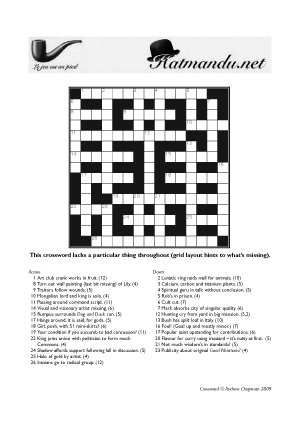I’m genuinely working on new features for it, and in fact although the personality thing is a bit of fun, I think the site will have serious uses to give it longer-term appeal. For one thing, it’s useful to see stats and a user profile all on one page anyway; in future I want users to see how their stats have changed over time. I’m also working on a system to suggest relevant users for people to follow. If you have more ideas, do let me know.
Month: April 2009
The patron saint of procrastinators
You have not above 300 volumes to write before you come to it— & as you write perhaps a volume once in ten years, you have ample Time, my dear Fellow!— Never be ashamed of scheming — you can’t think of living less than 4000 years, & that would nearly suffice for your present schemes—/To Be sure, if they go on in the same Ratio to the Performance, there is a small difficulty arises/but never mind! look at the bright side always— & die in a Dream!
The “dear fellow” he is talking to is of course himself, mocking his own tendency to scribble endless ideas for books and other projects in his notebooks – something I can relate to dearly.
Here’s another quote from the same year, 1804, collected in Anima Poetae:
This evening, and indeed all this day, I ought to have been reading and filling the margins of Malthus. I had begun and found it pleasant. Why did I neglect it? Because I ought not to have done this. The same applies to the reading and writing of letters, essays, etc. Surely this is well worth a serious analysis, that, by understanding, I may attempt to heal it. For it is a deep and wide disease in my moral nature, at once elm- and-oak-rooted. Is it love of liberty, of spontaneity, or what? These all express, but do not explain, the fact… From infancy up to manhood, under parents, schoolmasters, inspectors, etc., our pleasures and pleasant self-chosen pursuits (self-chosen because pleasant, and not originally pleasant because self-chosen) have been forcibly interrupted, and dull, unintelligible rudiments or painful tasks imposed upon us instead. Now all duty is felt as a command…
A time will come when passiveness will attain the dignity of worthy activity, when men shall be as proud within themselves of having remained in a state of deep tranquil emotion, whether in reading or in hearing or in looking, as they now are in having figured away for an hour…
His defensive stance on being allowed to dream is the tip maybe of an iceberg of agonies about his lack of output – but he still managed to outcreate most people, and much as some (far from all!) of his poetry is fantastic, I think it’s his prose which should be his lasting monument. He almost created a genre by himself – fragmentary reflections, allusions, digressions (all of which were what attracted him to Borges).
Some day I’d like to collect his thoughts of this kind into a ‘defence of dreaming’… But I probably won’t. And maybe that’s the point.
